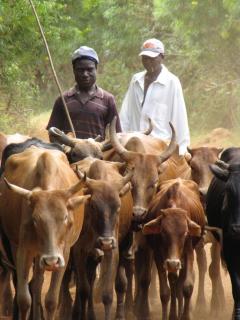Cattle health resource supports livestock research
A free database and biobank on cattle health developed from research in Western Kenya will support further studies.

A newly developed, freely available database of African cattle health will support research to improve the wellbeing and productivity of livestock around the world.
The Infectious Diseases of East African Livestock (IDEAL) database, developed from a study of more than 500 East African calves, gives users free access to extensive data on genetics and physical traits, as well as study protocols.
The database is also linked to an extensive biobank of more than 20,000 serum, DNA and tissue samples that were collected during the study.
It was developed over three years by an international team of researchers led by the Roslin Institute.
Field samples
The project gathered information on 548 East African shorthorn zebu calves in Western Kenya throughout their first year of life.
Clinical data, blood and tissue samples were collected at regular visits, and samples were screened for more than 100 infectious organisms, such as viruses and bacteria.
Samples are held under an open access policy at the International Livestock Research Institute (ILRI) in Kenya. Researchers may apply for access to the samples to support their studies.
To improve the accessibility and functionality of the database for future studies, the team extracted information from the database and reduced its 200 separate datasets to eight linked, fully searchable tables.
Free access to samples and data from the IDEAL project is intended to support research in the dynamics of infectious disease, by saving other teams from carrying out time-consuming, costly field work.
Details of the study are highlighted in a paper published in Nature Scientific Data.
The field work was funded by Wellcome, and the database development was funded by the Centre for Tropical Livestock Genetics and Health.
The ideal project was a ground-breaking study and was a huge challenge to manage in the field. Its success was down to the hard work of a large team of people. It is great that now all these data and the linked sample biobank at ILRI are available to the wider community.
** The Roslin Institute receives strategic investment funding from the Biotechnology and Biological Sciences Research Council and it is part of the University of Edinburgh’s Royal (Dick) School of Veterinary Studies. **
Related links
International Livestock Research Institute (ILRI)
Image credit: A Jennings and M Bronsvoort / University of Edinburgh


